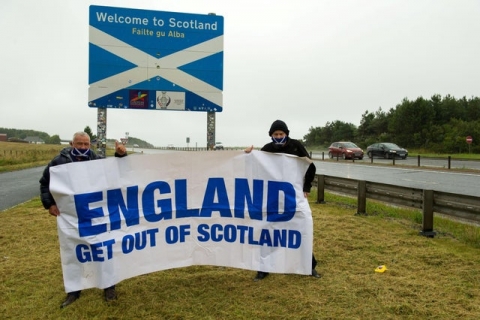British Prime Minister's visit to Scotland fails to shore up the Union

The increasingly unpopular Prime Minister of the United Kingdom (UK), Boris Johnson, has been visiting Scotland this week. In what is seen as an attempt to try and counter the rise in support for Scottish independence the visit has been widely thought of as a failure in regards to shoring up the Union. The Union in question being the 1707 Acts of Union that declared that the kingdoms of England and Scotland were "United into One Kingdom by the Name of Great Britain".
The UK Prime Minister and Conservative Party leader's visit came after support for Scottish independence reached 54% in two opinion polls recently, while everything points to a big pro-independence majority at next year’s election for the Scottish Parliament (Scottish Gaelic: Pàrlamaid na h-Alba). At the same time Scotland's First Minister Nicola Sturgeon’s present approval ratings in Scotland are massively ahead of those of Boris Johnson. At this stage Members of the Scottish Parliament (MSPs) have endorsed the idea of a new independence referendum, giving Scotland a "cast-iron mandate". The UK government, however, continues to refuse to agree to a vote. Something that Scotland's First Minister states is unsustainable. A position particularly reinforced, as predicted, if there is a significant pro-independence majority in next year's Scottish Parliament elections.
A victory in another Scottish independence referendum would see Scotland leaving the United Kingdom. At the present the United Kingdom consists of three countries England, Scotland, Wales and also that part of the island of Ireland in the north-east in which Britain continues to have a colonial presence. The Isle of Man is not part of the United Kingdom. It also needs to be remembered that although Cornwall is governed as if it were part of the UK, at no time has any Act of Union or Joinder taken place between Cornwall and the Kingdom of England or its successor states. The Duchy of Charters of 1337 formalised and defined the relationship between the separate Sovereign territory of Cornwall and the Kingdom of England and these remain valid today.
Image: Recent protest at the Scottish - English border





